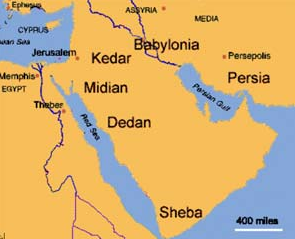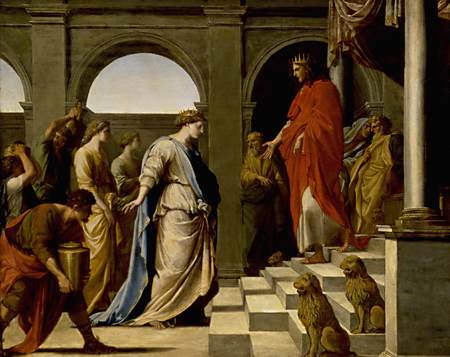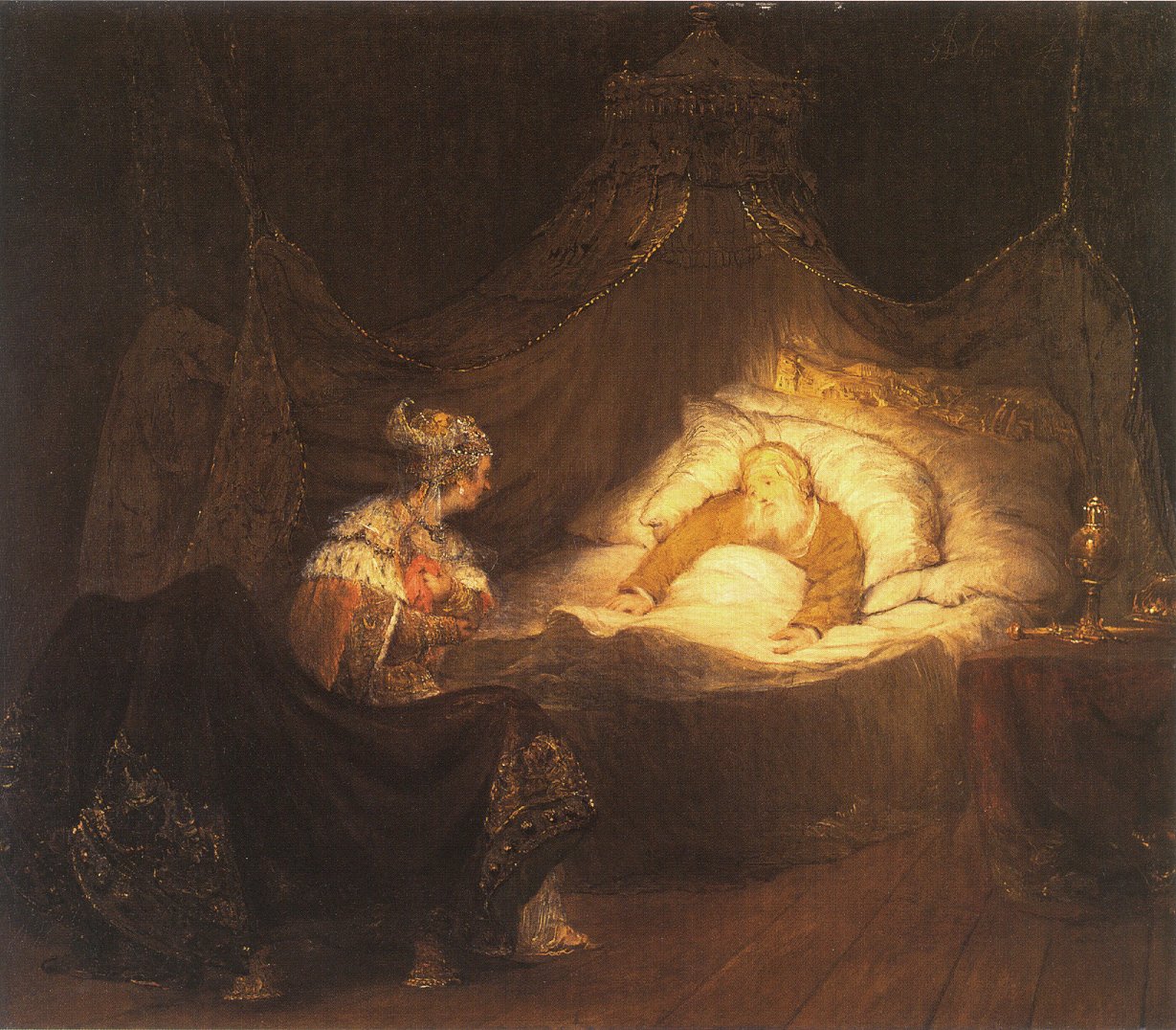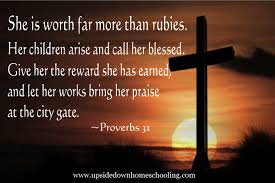Now when the queen of Sheba heard about the fame of Solomon concerning the name of the Lord, she came to test him with difficult questions. So she came to Jerusalem with a very large retinue, with camels carrying spices and very much gold and precious stones. When she came to Solomon, she spoke with him about all that was in her heart. Solomon answered all her questions; nothing was hidden from the king which he did not explain to her. When the queen of Sheba perceived all the wisdom of Solomon, the house that he had built, the food of his table, the seating of his servants, the attendance of his waiters and their attire, his cupbearers, and his stairway by which he went up to the house of the Lord, there was no more spirit in her. Then she said to the king, “It was a true report which I heard in my own land about your words and your wisdom. Nevertheless I did not believe the reports, until I came and my eyes had seen it. And behold, the half was not told me. You exceed in wisdom and prosperity the report which I heard. How blessed are your men, how blessed are these your servants who stand before you continually and hear your wisdom. Blessed be the Lord your God who delighted in you to set you on the throne of Israel; because the Lord loved Israel forever, therefore He made you king to do justice and righteousness.” She gave the king a hundred and twenty talents of gold, and a very great amount of spices and precious stones. Never again did such abundance of spices come in as that which the queen of Sheba gave King Solomon…. King Solomon gave to the queen of Sheba all her desire which she requested, besides what he gave her according to his royal bounty. Then she turned and went to her own land together with her servants.” (I Kings 10:1-13)
When a powerful king arose in a country, other kings would give him gifts to form alliances and  make trade agreements with each other. David and Solomon, Israel’s most powerful kings, formed many alliances with the nations around them. Our story this week is about the reigning queen of Sheba and how she came face to face with a new and powerful ruler. Sheba was in the Arabian Peninsula, where Yemen is today. In ancient times it was known as a nation possessing fabulous wealth. Frankincense and myrrh were two of the many precious spices that were exported.
make trade agreements with each other. David and Solomon, Israel’s most powerful kings, formed many alliances with the nations around them. Our story this week is about the reigning queen of Sheba and how she came face to face with a new and powerful ruler. Sheba was in the Arabian Peninsula, where Yemen is today. In ancient times it was known as a nation possessing fabulous wealth. Frankincense and myrrh were two of the many precious spices that were exported.
When the queen of Sheba heard about the fame of Solomon and his relation to the name of the Lord, she came to test him with hard questions. What had she heard about Jehovah? Was this woman seeking to know more about God? It seems that she mostly came to make the trade agreements. In that she was successful.
Arriving at Jerusalem with a very great caravan — with camels carrying spices, large quantities of gold, and precious stones — she came to Solomon and talked with him about all that she had on her mind… She gave the king 120 talents of gold, large quantities of spices, and precious stones. Never again were so many spices brought in as those the queen of Sheba gave to King Solomon. (1 Kings 10:1-2, 10)
Spices don’t seem so special to us, but in the ancient world, some were outrageously expensive because of their rarity and use as perfumes, incense and medicine. Some were grown only in certain countries and they had to be brought great distances. Only a king could afford to purchase them. The queen of Sheba needed to bring something really impressive for the great king and her gift surpassed any gift ever seen before.
The conversation between Solomon and the queen stayed mostly on Solomon’s wisdom, his wealth, and the wealth of the land. But then the queen said something interesting.
 “How blessed are your men, how blessed are these your servants who stand before you continually and hear your wisdom. Blessed be the Lord your God who delighted in you to set you on the throne of Israel; because the Lord loved Israel forever, therefore He made you king, to do justice and righteousness.” These words are strangely prophetic. We do not know if the queen of Sheba came to believe in Jehovah as the only true God. Again, it is more likely that she just added Him to the list of gods that she worshipped. She certainly was impressed with the blessings in Israel and seems to have acknowledged them as coming from Jehovah. But we won’t know until we get to Heaven if the queen truly relinquished her other gods for the one true God. Since she did not make a gift to the temple, it is more probable that she went home happy with the trade agreements that she came to make. That was what she really came for.
“How blessed are your men, how blessed are these your servants who stand before you continually and hear your wisdom. Blessed be the Lord your God who delighted in you to set you on the throne of Israel; because the Lord loved Israel forever, therefore He made you king, to do justice and righteousness.” These words are strangely prophetic. We do not know if the queen of Sheba came to believe in Jehovah as the only true God. Again, it is more likely that she just added Him to the list of gods that she worshipped. She certainly was impressed with the blessings in Israel and seems to have acknowledged them as coming from Jehovah. But we won’t know until we get to Heaven if the queen truly relinquished her other gods for the one true God. Since she did not make a gift to the temple, it is more probable that she went home happy with the trade agreements that she came to make. That was what she really came for.
It should not surprise us that queen of Sheba spoke prophetic-sounding words. Other unbelievers in the Bible spoke truth even though they didn’t know it. One familiar story comes from the Gospel of John where the rulers of Israel are conspiring to capture Jesus and put Him to death. “But one of them, Caiaphas, who was high priest that year, said to them, ‘You know nothing at all, nor do you take into account that it is expedient for you that one man die for the people, and that the whole nation not perish.’ Now this he did not say on his own initiative; but being high priest that year, he prophesied that Jesus was going to die for the nation, and not for the nation only, but in order that He might also gather together into one the children of God who are scattered abroad.” (John 11:51,52) God can move anyone, even unbelievers, to speak as He wishes.
The queen of Sheba spoke truth when she blessed God, Solomon, and the Israelites. She could not help herself. But I am not sure that this means that she was converted.
Solomon then gave the queen many things. This was common for trade agreements. It is interesting to see that Solomon then turned much of the gold and metals he received from the queen of Sheba and other Arabian traders into weapons of war. How sad.
While Solomon made trade agreements with all of the surrounding nations (I Kings 10:15) only this special story about one of the foreign rulers is recorded for us. It is interesting that it is a woman. It is interesting that later we find out that Solomon takes seven hundred wives. It is assumed that these were alliances for treaty purposes.
But the queen of Sheba was not one of Solomon’s wives. She was the reigning monarch of her own country. She secured an alliance with Solomon strictly on trade. Jewish scholars have many legends about her including one where she and Solomon had an affair and a child was born from their union. They are only speculating.
I don’t believe those stories. The story in the Bible about a strong woman who came and secured peace for her country is exciting enough without all the fables.



